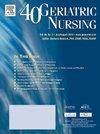从轻度认知障碍恢复到正常认知的患病率及其影响因素:一项系统回顾和荟萃分析
IF 2.5
3区 医学
Q3 GERIATRICS & GERONTOLOGY
引用次数: 0
摘要
目的探讨轻度认知障碍(MCI)向认知正常人群逆转的总患病率及其影响因素。方法系统检索spubmed、Embase、Web of Science、Cochrane Library、万方数据库、中国知网(CNKI)、唯普数据库、中国医学信息数据库自建库至2023年6月1日的文献。参与者被诊断为轻度认知障碍成人。结果共筛选4075项研究,采用48项研究的数据进行meta分析,涉及31876名受试者。从轻度认知障碍恢复到正常认知的总患病率为31%。与MCI恢复到正常认知相关的危险因素有:教育程度(低至高)、年龄、简易精神状态检查(MMSE)、功能活动问卷(FAQ)、听觉言语学习测试(AVLT)延迟回忆测试、载脂蛋白E (APOE)阳性、多功能域受损、生活自理、抑郁、每天做家务/每周锻炼一次。结论MCI患者认知恢复正常的总体患病率较高,且存在可控因素。了解MCI恢复到正常认知的可控因素,可以为临床医生对患者的管理和治疗提供理论依据。本文章由计算机程序翻译,如有差异,请以英文原文为准。
The prevalence and influencing factors of reversion from mild cognitive impairment to normal cognition: A systemic review and meta-analysis
Objective
The aim was to investigate the pooled prevalence of reversion from mild cognitive impairment (MCI) to normal cognition people, and the influencing factors for reversion.
Methods
PubMed, Embase, Web of Science, The Cochrane Library, Wanfang Database, China Knowledge Resource Integrated Database (CNKI), Weipu Database, SinoMed were systematically searched from the inception to June 1, 2023. Participants were diagnosis as MCI adults.
Results
In total, 4075 studies were screened and data from 48 studies involving 31876 subjects were used in meta-analysis. The pooled prevalence of reversion from MCI to normal cognition was 31%. The following risk factors were associated with the reversion from MCI to normal cognition: education (low to high), age, Mini-Mental State Examination (MMSE), Functional Activities Questionnaire (FAQ), Auditory Verbal Learning Test (AVLT) delay recall test, Apolipoprotein E (APOE) positive, multiple domain impaired, live along, depression, doing house work daily/exercise once a week.
Conclusions
The study shows the pooled prevalence of reversion from MCI to normal cognition was high, and there are controllable factors. Understanding the controllable factors of reversion from MCI to normal cognition can provide the clinicians with the theoretical basis for the management and treatment of the patients.
求助全文
通过发布文献求助,成功后即可免费获取论文全文。
去求助
来源期刊

Geriatric Nursing
医学-护理
CiteScore
3.80
自引率
7.40%
发文量
257
审稿时长
>12 weeks
期刊介绍:
Geriatric Nursing is a comprehensive source for clinical information and management advice relating to the care of older adults. The journal''s peer-reviewed articles report the latest developments in the management of acute and chronic disorders and provide practical advice on care of older adults across the long term continuum. Geriatric Nursing addresses current issues related to drugs, advance directives, staff development and management, legal issues, client and caregiver education, infection control, and other topics. The journal is written specifically for nurses and nurse practitioners who work with older adults in any care setting.
 求助内容:
求助内容: 应助结果提醒方式:
应助结果提醒方式:


